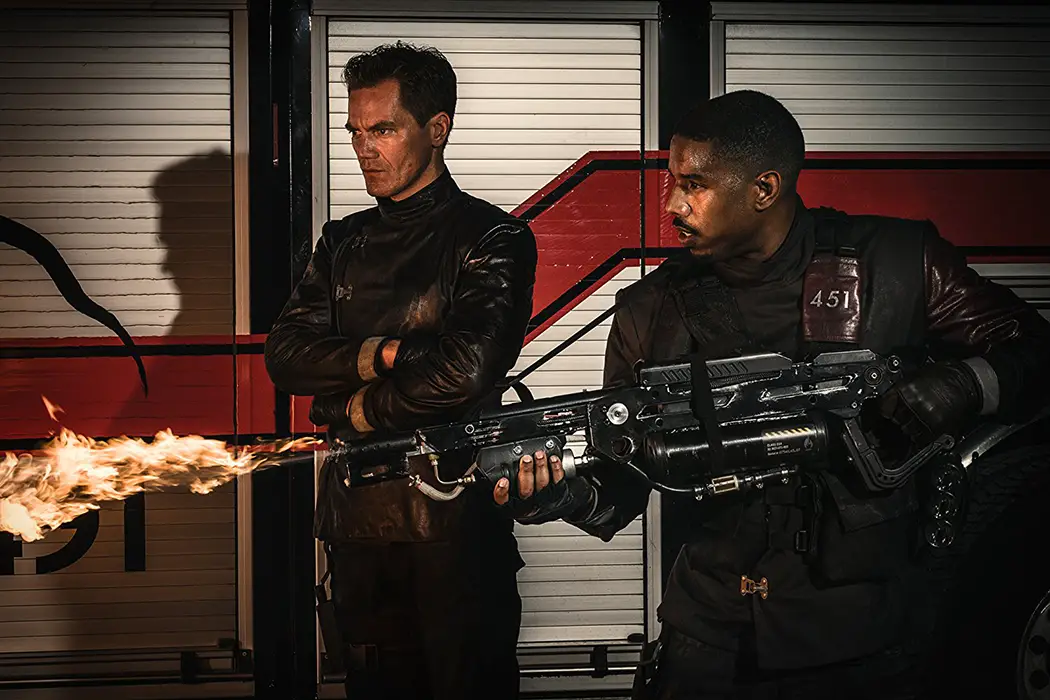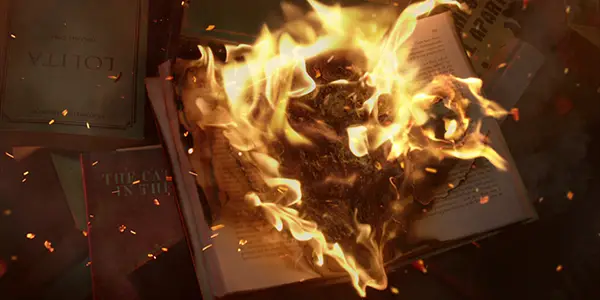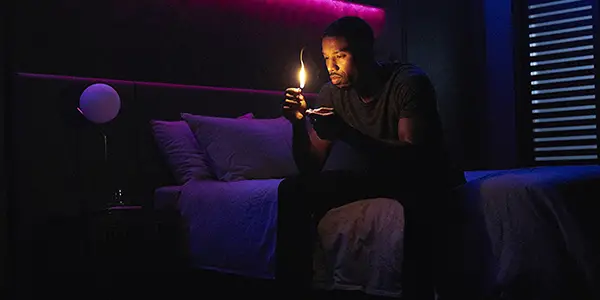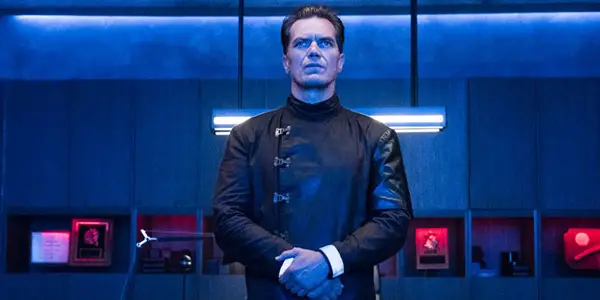FAHRENHEIT 451: Smolders But Doesn’t Ignite

David is a film aficionado from Colchester, Connecticut. He enjoys…
Ray Bradbury’s 1953 novel warned us of a day when technology would supersede pursuits of knowledge, where people willingly gave up books for mindless mass media. When you look around at our current world, where the younger generation dazedly wanders with their face pressed into smartphones, and people wile away hours a day watching reality TV, it’s not hard to suggest that his prediction may be coming somewhat true.
It’s only fitting, then, that Fahrenheit 451 would eventually be looked back at and remade for the big screen, or small screen in this case. Yet, though modernized in all the requisite ways, one can’t help but feel that this current incarnation of the story is somewhat lacking. The building blocks are there, but the end result leaves much to be desired.
Modernized Adaptation
Fahrenheit 451 takes place in a foreseeable dystopian future. Here, “firemen” exist, and instead of being responsible for preventing fires, they are tasked with starting them instead, specifically for the purposes of burning any forms of knowledge, such as books. Guy Montag (Michael B. Jordan) is one of these firemen, who has been shaped into his current role by commanding officer Captain Beatty (Michael Shannon). Yet, when Montag witnesses an incident involving an old woman and subsequently meets an informant named Clarisse (Sofia Boutella), he starts to question what he does, which leads to him discovering a resistance group called the “eels.”

Co-written by Amir Naderi and Ramin Bahrani and directed by Bahrani, Fahrenheit 451 is initially intriguing. Rather than simply adapt Bradbury’s novel outright, the story has instead been updated to include modern technology, with an early scene that includes the raiding of a house that had been uploading books to a series of hard drives. Burning, we soon find out, is not only limited to paper books.
The world-building of Bahrani‘s film is surprisingly realized as a whole for a film that is relatively small scale. Entire city landscapes resemble the clustering noise of Times Square, including large brightly-lit displays that flash across the fronts of buildings, with the words “Stay Vivid” imprinted on them. An individual AI unit called Yuxie is also installed in every home, and the sense is given that there is always somebody on the other end listening. In our current environment, where many people have an Amazon Echo in their own living room and our personal information online is increasingly at risk, the film hits especially close to home.
Interestingly, as the story progresses, the world around the people who live as outsiders gets less advanced, and digital technology is replaced by paper books and libraries, with the outcast groups seeming to realize that they are more likely to get away with their knowledge-building in this primitive form. It’s a prominent reminder that sometimes returning to our roots is the best way to move forward.
Generic Thriller
What soon proceeds from this initial buildup, though, is what unfortunately causes Fahrenheit 451 to falter; the inclusion of a MacGuffin, which I won’t elaborate on too greatly for spoiler’s sake, soon forces the film into a more rigid narrative direction. It reminded me somewhat of 2014’s adaptation of The Giver, another film based on a dystopian novel, which also adds an unnecessary plot point to its story. The MacGuffin, in both cases, serves the purpose of adding closure to their respective films.

Yet, this is not only unnecessary for the story being told, but in a way feels pandering as well. Whereas before, we were following along with Montag’s journey for the purposes of seeing how his eyes are opening to the world, now we are instead following a clearly laid-out path, which leads where you are expecting it to. Gone are the ventures into reading, which included passages from Dostoevsky’s Notes From Underground and intimate discussions about the importance of knowledge with the Eel rebel group. Replacing it is a quest, which has the potential to end in an all-too-tidy way.
Bradbury’s novel is as compelling as it is because it doesn’t provide any definitive answers, or conclude in a particularly satisfying way; whereas Bahrani‘s film version, by including this sudden plot point, soon transforms into a more traditional and generic dystopian thriller.
Talented Cast
Fahrenheit 451 does at least have a couple things working for it. For one, it includes the talents of two Michaels: Michael B. Jordan and Michael Shannon. Jordan, hot off the recent success of Black Panther, in which he played one of the more memorable Marvel villains of the series, here plays an equally complex character, though one who ultimately chooses the side of good. Montag’s development from proud book burner to firm rebel is convincing enough, even given some underwritten plot points that the character is provided with (a barely-there romance between him and Sofia Boutella‘s Clarisse, for example).

Michael Shannon, who previously starred in Bahrani‘s 99 Homes, is also perfectly cast as Captain Beatty, the primary villain of Fahrenheit 451. Shannon, who has become synonymous with villains from his many performances, often just lets his trademark scowl do the work. The character’s subdued, menacing nature strikes an engaging contrast with the more outwardly reckless yet optimistic Montag.
Beatty is also more layered than a typical villain, with much of this due to Bradbury‘s already thoughtful writing. Knowledgeable about books in general, he becomes sympathetic due to his reasoning for burning them, claiming that they all have the potential to start conflicts. As he plainly and somewhat convincingly states: “we all become equal with the flames.”
Fahrenheit 451: Conclusion
To conclude, Fahrenheit 451, though initially compelling, ultimately does little to expand the prominent ideas of Ray Bradbury’s work. Given the comparison of our modern world to the one that Bradbury feared in the paranoid era of the 1950’s, one would think that his story would be ripe for thematic mining.
Yet, with the inclusion of a MacGuffin and the eventual predictable narrative that follows, Fahrenheit 451 instead misses out on a golden opportunity. Jordan and Shannon commit, but there’s just not much else holding together this loosely-threaded adaptation.
What are your thoughts? Are you a fan of modern dystopian films? Tell us your thoughts in the comments below!
Fahrenheit 451 is now available on HBO.
Does content like this matter to you?
Become a Member and support film journalism. Unlock access to all of Film Inquiry`s great articles. Join a community of like-minded readers who are passionate about cinema - get access to our private members Network, give back to independent filmmakers, and more.
David is a film aficionado from Colchester, Connecticut. He enjoys writing, reading, analyzing, and of course, watching movies. His favorite genres are westerns, crime dramas, horror, and sci-fis. He also enjoys binge-watching TV shows on Netflix.













